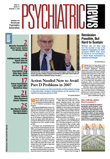Could there be an interplay between the positive symptoms that schizophrenia patients experience and their emotions? A new inquiry conducted in England suggests that there is.
It was headed by Ben Smith, Ph.D., a clinical research fellow at University College London. Results appeared in the September Schizophrenia Research.
One hundred individuals with schizophrenia, schizoaffective disorder, or delusional disorder who had suffered a recent relapse of their psychosis agreed to participate in a clinical trial designed to help them prevent more relapses. But before they entered the trial, the researchers assessed the subjects for specific positive symptoms such as auditory hallucinations, persecutory delusions, and grandiose delusions. Fifty-seven percent reported experiencing auditory hallucinations, 55 percent persecutory delusions, and 17 percent grandiose delusions.
Subjects were then assessed for levels of self-esteem, depression, and negative views they held about themselves and others. Examples of negative beliefs about oneself were “I am unloved,” “I am worthless,” and “I am weak.” Examples of negative beliefs about others were “Other people are hostile,” “Other people are unforgiving,” and “Other people are nasty.” Finally the researchers attempted to see whether there were associations between subjects' specific positive symptoms and their scores for self-esteem, depression, and negative views.
Persecutory delusions were found to be linked, to a highly significant degree, with depression, low self-esteem, and negative views of self. This was something that the researchers had expected. However, the link between persecutory delusions and negative beliefs about others, while significant, was weaker than the scientists had expected.
Auditory hallucinations were also found to be strongly linked with depression and low self-esteem, as the researchers had predicted, but were not significantly associated with negative beliefs about either oneself or others.
As for grandiose delusions, they were inversely and significantly associated with depression, low self-esteem, and negative beliefs about self, yet to the scientists' surprise, they were not associated with negative beliefs about others.
“This is a very interesting report,” Ralph Hoffman, M.D., a professor of psychiatry at Yale University and an authority on auditory hallucinations, told Psychiatric News. “Our own research involving patients with auditory hallucinations appears to confirm findings reported here. For instance, anxiety, depression, or fearfulness often appear to worsen the frequency and severity of these hallucinations, as well as bias verbal content to match these emotions... .A patient in a depressed state is more likely to hear a voice stating that he is no good or that he ought to be dead.”
Because of the cross-sectional nature of the study, it was impossible to determine whether the emotions under scrutiny contributed to auditory hallucinations and delusions or resulted from them, Smith acknowledged. However, he suspects that both situations are possible, setting a vicious cycle into motion. And Hoffman agreed. In a follow-up longitudinal study, Smith and his colleagues will try to untangle the cause-and-effect interactions between these emotions and hallucinations and delusions.
Smith and his group are also attempting to see if cognitive-behavioral therapy can temper schizophrenia subjects' depression and negative views and increase their self-esteem and if these emotional changes in turn can dampen their auditory hallucinations and persecutory delusions.
The study was funded by the Wellcome Trust.
An abstract of “Emotion and Psychosis: Links Between Depression, Self-Esteem, Negative Schematic Beliefs and Delusions and Hallucinations” can be accessed at<www.sciencedirect.com> by clicking on “S” and then “Schizophrenia Research.” ▪
